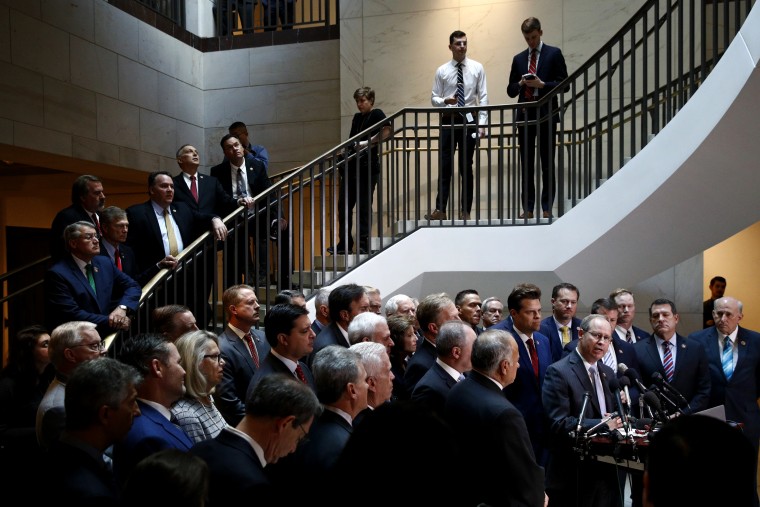Republican criticism of the ongoing impeachment inquiry process for deposing witnesses in closed-door sessions is absurd — and that was before they held a news conference Wednesday and stormed a secure hearing room, interrupting the testimony of a Pentagon official.
The GOP has cited two alleged shortcomings in the inquiry procedure: Members of Congress who do not serve on the three committees hearing testimony are barred from attending; and the depositions are not being held in a public session.
Both criticisms are baseless, because members of Congress today have a much greater role in obtaining evidence than the Judiciary Committee members had in the Nixon impeachment inquiry in 1974, and the chairman has said that the testimony will, indeed, be heard in public during the investigatory process.
Currently, House Republicans who are members of the House Intelligence, Foreign Affairs and Oversight and Reform Committees — and there are 47 such members in total — not only are present for the depositions, but also they can question all witnesses. Of the Republican representatives who stormed the impeachment committee hearing room Wednesday, 13 are actually members of one of those committees and had the ability to enter the room unimpeded and participate fully in the deposition.
This was not the case in the impeachment inquiry of President Richard Nixon 45 years ago. In 1974, the impeachment inquiry staff attorneys, not the House members, interviewed the witnesses during the initial investigation.
Much as with today’s Republicans, in a public Judiciary Committee hearing on July 25, 1974 — only days before the committee voted on articles of impeachment — Rep. Delbert L. Latta, R-Ohio, bemoaned that the nine witnesses testifying in person to the committee in the impeachment inquiry appeared in executive session to which the public and other members of Congress had been excluded. “It was unfortunate during our deliberations that the American people were denied their right to listen to the few witnesses who appeared before this committee by a party line vote, and are now only being invited to sit in on these hearings.”
A Republican on the committee, Rep. Joseph J. Marzatti of New Jersey, criticized the Democratic majority for its failure to “provide, from the beginning, for the calling of live witnesses.” He criticized the fact that House members, as opposed to staff, did not question witnesses until the eve of the impeachment vote. “We did call witnesses, a total of nine, but at the end of the proceedings.”
Today, the public has been promised that it will get transcripts of the depositions, and see and hear witnesses for themselves during the investigatory process.
Last week in a letter to members of Congress, Intelligence Committee Chairman Adam Schiff wrote that transcripts of the depositions would be made public subject only to redactions for the classified information discussed — which is the reason the witnesses are testifying in a secure location in which electronic devices are prohibited — and "[w]e also anticipate that at an appropriate point in the investigation, we will be taking witness testimony in public, so that the full Congress and the American people can hear their testimony firsthand."
In late July 1974, Rep. Carlos Moorhead, R. Calif., complained that the impeachment inquiry staff attorneys did not take sworn depositions, but only interviewed friendly witnesses without a written record. Today, the House committees have subpoenaed a broad range of witnesses and their testimony under oath is being transcribed verbatim.
History has judged the bipartisan verdict of the House Judiciary Committee in 1974 to have been fair and its procedures proper. Six Republican members approved impeachment Article I, charging Nixon with obstruction of justice, seven Republican members voted in favor of Article II, charging the president with an abuse of power, and two Republicans supported Article III, impeaching Nixon for stonewalling congressional subpoenas in the impeachment inquiry.
This band of Republicans who stormed the hearings this week seemed to be demanding that the testimony of these witnesses be made public — but that is the last thing that they should want, which is probably why their efforts did more to disrupt the process than show why they should be allowed to participate. These witnesses have reportedly already presented damning evidence that President Donald Trump engaged in an effort to withhold congressionally authorized military aid to Ukraine unless the president of Ukraine publicly announced an investigation of Trump’s political rival, Joe Biden.
The public testimony they’re nominally demanding will happen, though. And when these witnesses testify in televised public hearings, support for impeachment will soar.


